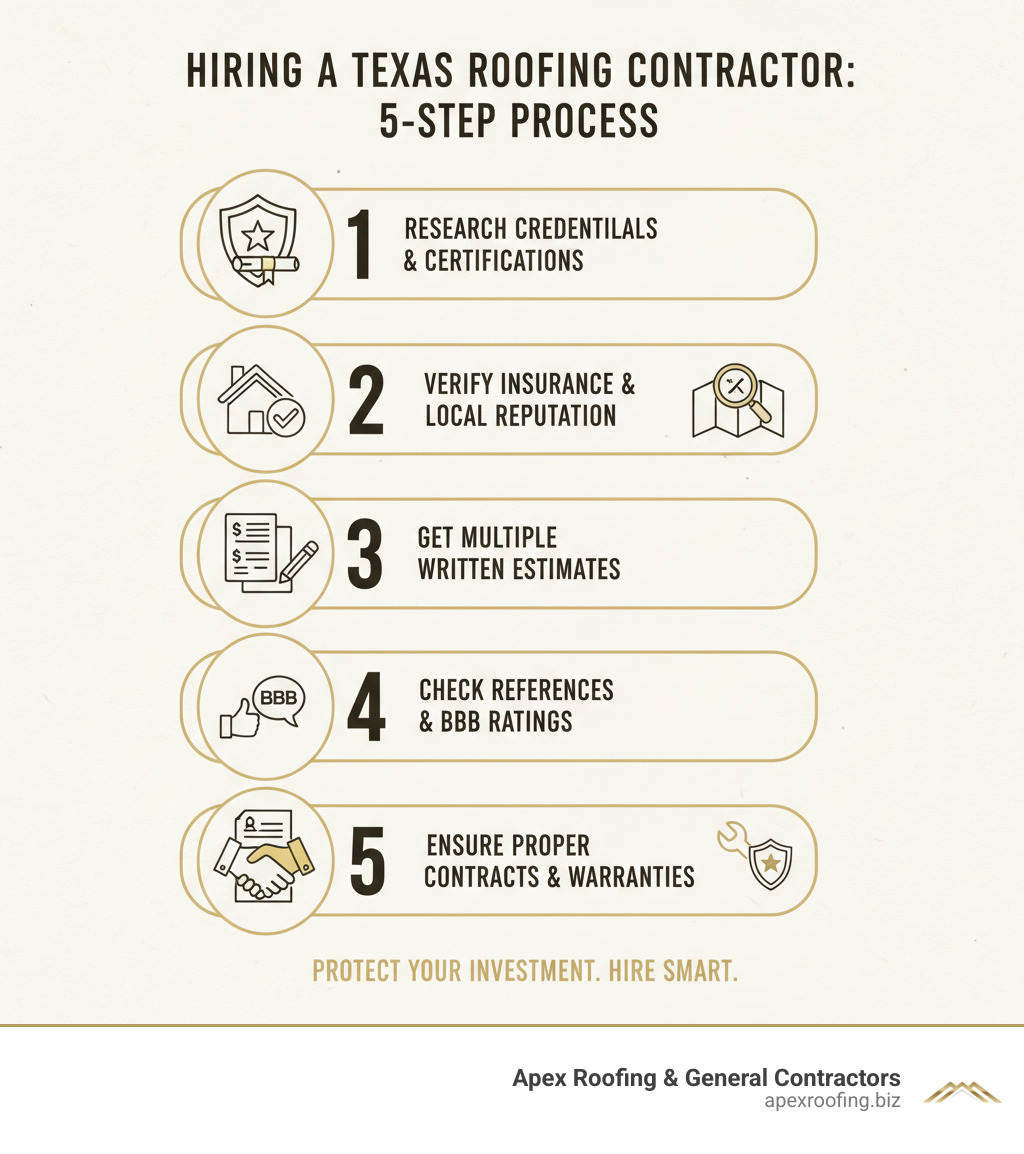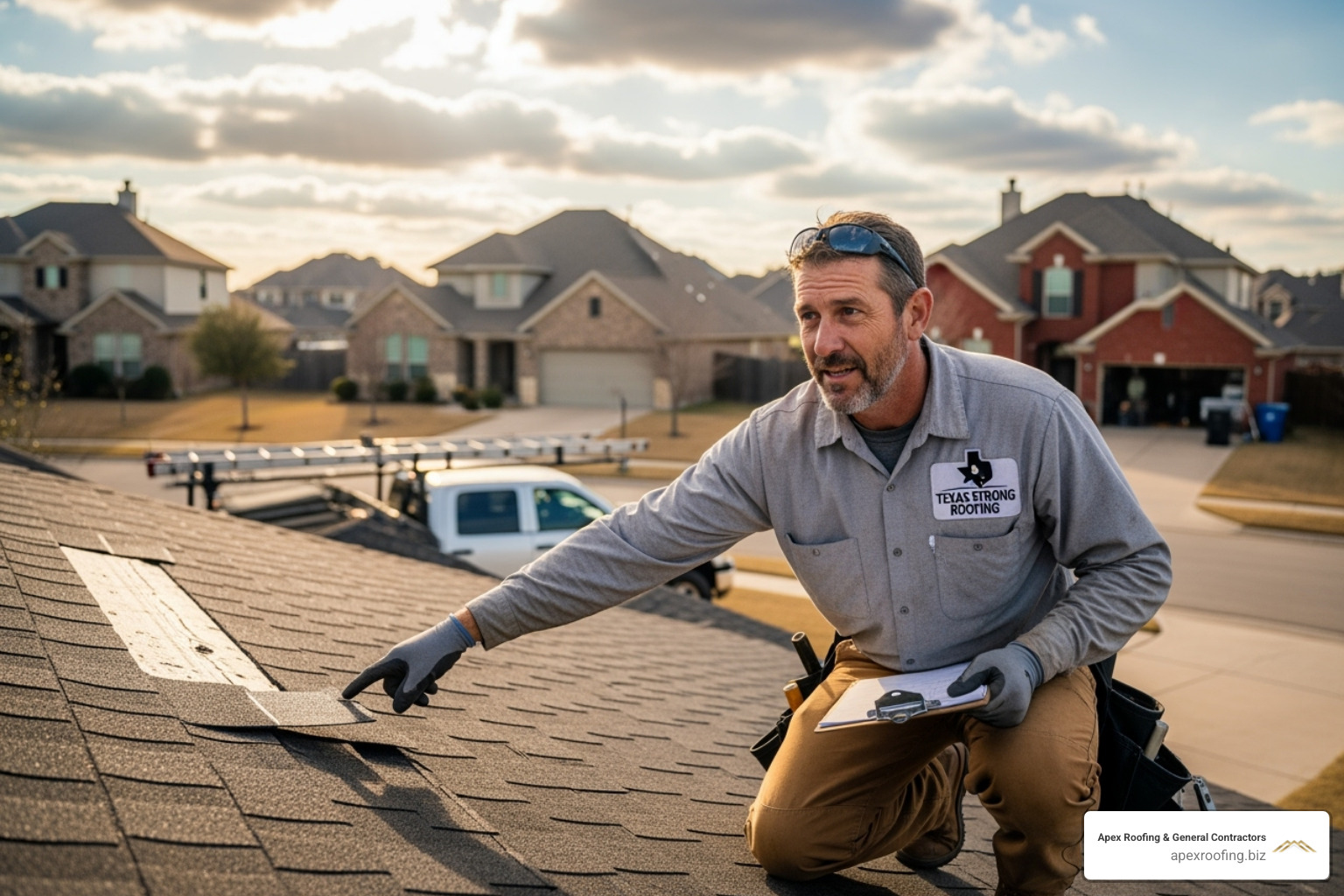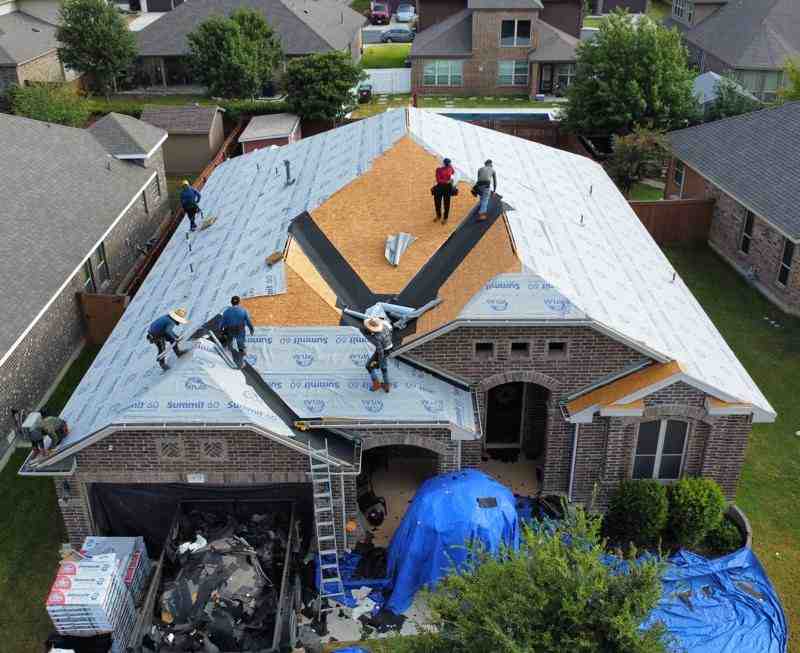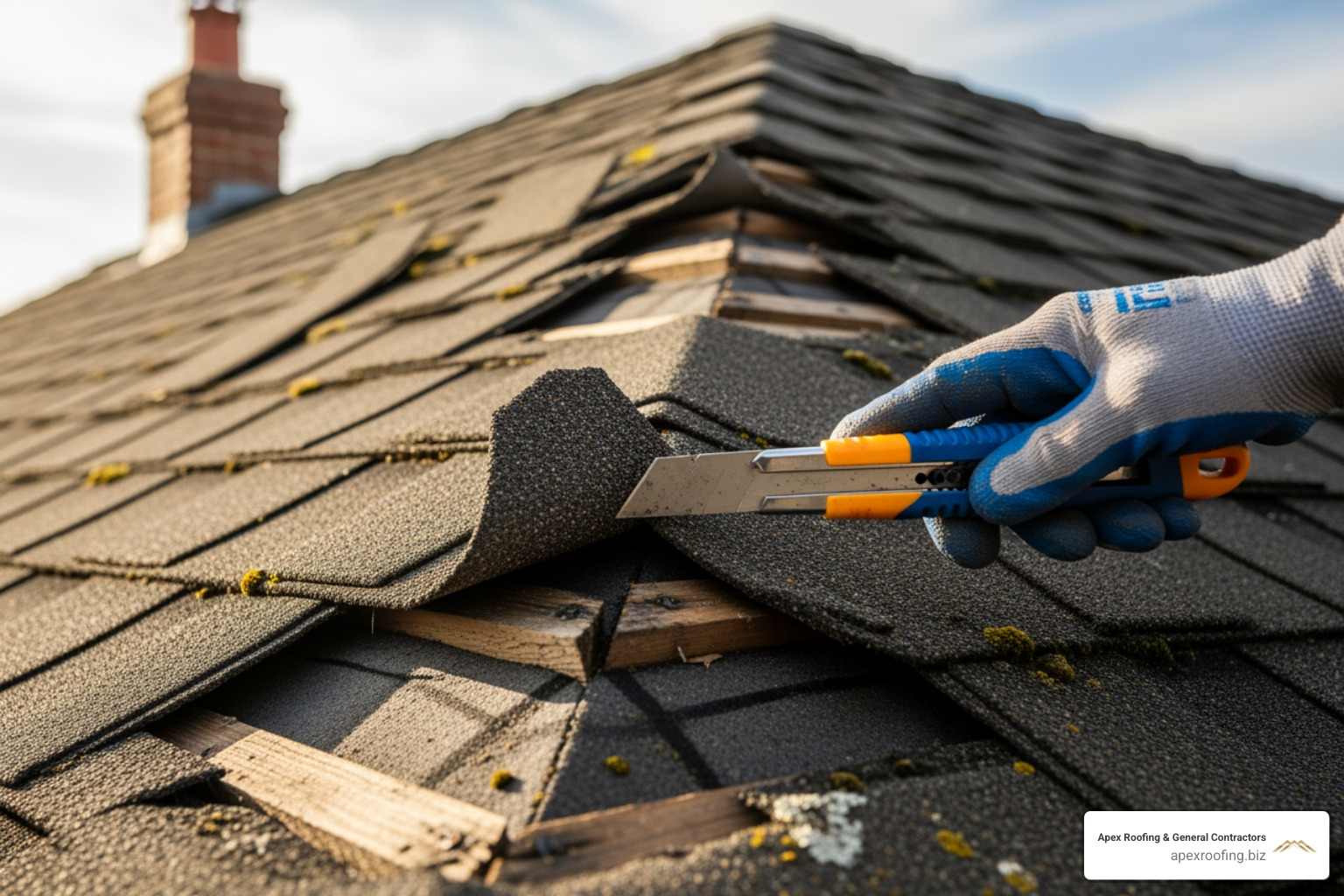Why Texas Homeowners Face Unique Roofing Challenges
Finding the right roofing contractor TX is more challenging than in most states—and the stakes couldn’t be higher. With no state licensing, registration, or insurance requirements, homeowners are left vulnerable to unqualified workers and potential fraud. The good news is that you can protect your investment by partnering with certified roofing professionals who have a proven track record in Texas. This due diligence is essential.
Key Facts About Texas Roofing Contractors:
- No state licensing or registration required
- No mandatory insurance coverage
- Homeowners must pay their own insurance deductibles (it’s illegal for contractors to cover them)
- RCAT (Roofing Contractors Association of Texas) offers voluntary certification
- Due diligence is essential to avoid scams and poor workmanship
The Texas climate adds another layer of complexity. With relentless heat, sudden hailstorms, and high winds, your roof takes a beating year-round. Storm damage is common, and insurance claims can be complicated. Many homeowners find too late that their “bargain” contractor cut corners or disappeared entirely.
I’m Carlos Yzaguirre, President of Apex Roofing & General Contractors, and I’ve been helping Texas homeowners steer these challenges since 2022. As a roofing contractor TX business owner, I’ve seen how proper vetting and choosing the right contractor can mean the difference between a roof that lasts decades and one that fails within years.

The Wild West of Roofing: Understanding Texas Regulations
Texas truly is the Wild West when it comes to roofing regulations. If you’re searching for a roofing contractor TX, you’re stepping into territory with virtually no rules—and that puts all the responsibility squarely on your shoulders.
The Unregulated Landscape
Picture this: your neighbor’s teenager could legally hang up a “roofing contractor” sign tomorrow and start taking jobs. No license required. No training verified. No insurance mandated. Welcome to Texas, where the roofing industry operates with less oversight than your local food truck.
This unregulated landscape creates a perfect storm of problems for homeowners. Without state licensing, registration requirements, or mandatory insurance, you’re vulnerable to everyone from well-meaning amateurs to outright scammers. Storm chasers love Texas for exactly this reason—they can blow into town after a hailstorm, do quick (often shoddy) work, and disappear before problems surface.
The reality is stark: no state oversight means no safety net for you as a homeowner. Every bit of due diligence falls on your shoulders. You become the quality control department, the background checker, and the insurance verifier all rolled into one.
But here’s some hope in this regulatory wasteland. Many reputable contractors voluntarily seek industry certifications and join professional associations. The Roofing Contractors Association of Texas (RCAT) requires members to pass rigorous screening and complete ongoing education. When you’re evaluating potential contractors, look for these voluntary commitments to excellence—they’re often your best indicator of professionalism in an otherwise unregulated field.
Insurance Deductibles and Texas Law
Here’s where things get legally serious, and every Texas homeowner needs to pay attention. It’s illegal for any roofing contractor TX to waive, absorb, or pay your insurance deductible. Period. No exceptions.

This law exists for good reason. When contractors “cover” your deductible, they typically inflate invoices or create fake charges to make the insurance company pay more. What seems like a generous offer from your contractor is actually insurance fraud—and you become an accomplice.
The legal consequences are no joke. Under Texas law on insurance fraud, both contractors and homeowners can face misdemeanor or felony charges. Falsified invoices, inflated repair costs, and deceptible schemes all fall under this statute. Even if you thought you were just accepting a “good deal,” ignorance won’t protect you in court.
Your legal responsibility as a homeowner is crystal clear: you must pay your own deductible. Any contractor who suggests otherwise is waving a giant red flag. If they’re willing to break the law on billing, what corners might they cut on your actual roof?
Think of it this way—a contractor who follows the law on deductibles is more likely to follow building codes, use quality materials, and stand behind their work. Those who don’t? Well, good luck finding them when your roof starts leaking.
For more detailed information on protecting yourself from these schemes, visit Safe Roofs Over Texas, which offers comprehensive guidance on navigating insurance claims legally and safely.
Vetting Your Options: How to Choose the Right Roofing Contractor TX
With no state oversight, how do you separate the experts from the storm chasers? By focusing on verifiable credentials, a proven track record, and transparent business practices. A little homework now saves major headaches later.
Finding a trustworthy roofing contractor TX can feel like searching for a needle in a haystack. But don’t worry—with the right approach, you can identify the professionals who’ll protect your home for decades to come. The key is knowing what to look for when everyone claims to be “the best.”
Key Credentials for a Texas Roofing Contractor
Since Texas doesn’t require licensing, smart homeowners look for other markers of professionalism. Think of these credentials as your safety net in an unregulated market.
Voluntary industry certifications are your first green flag. When a roofing contractor TX earns certifications from major manufacturers like GAF Master Elite™, CertainTeed ShingleMaster™, or Owens Corning Platinum Preferred, they’re proving they’ve met rigorous training standards. These aren’t participation trophies—they require real expertise and ongoing education. Plus, manufacturer certifications often come with improved warranty options that protect your investment. GAF roofer certification details show just how comprehensive these programs can be.
Insurance coverage is absolutely non-negotiable. Any reputable contractor carries both general liability insurance and workers’ compensation. General liability protects your property if something goes wrong during the project. Workers’ compensation ensures you won’t be liable if someone gets hurt on your roof. If a contractor can’t produce current insurance certificates, keep looking.

The Better Business Bureau rating offers another layer of insight. An A+ rating means the company consistently resolves customer concerns professionally. It’s not perfect, but it’s a useful data point. Check a company’s BBB profile to see how they handle complaints and customer service issues.
At Apex Roofing & General Contractors, we maintain comprehensive insurance coverage and pursue ongoing certifications because we believe homeowners deserve that peace of mind—especially in an unregulated market.
Experience and Local Reputation
Texas weather doesn’t mess around, and neither should your roofing contractor. Local knowledge of Texas climate makes all the difference between a roof that survives our storms and one that fails when you need it most.
A contractor who’s weathered multiple Texas hail seasons understands which materials perform best under our blazing sun and sudden temperature swings. They know that what works in Minnesota might fail miserably in San Antonio. Years in business in Texas specifically matter more than general experience elsewhere.
Checking online reviews gives you the real story. Look beyond the star ratings—read what people actually say about their experiences. Pay attention to how contractors respond to negative reviews. Do they address concerns professionally, or do they get defensive? A pattern of thoughtful responses shows maturity and customer focus.
Don’t skip asking for local references you can actually contact. A confident contractor will happily share names of recent customers in your area. When you call these references, ask about timeliness, cleanliness, and how well the contractor communicated throughout the project.
Verifying a physical business address might seem obvious, but you’d be surprised how many “contractors” operate solely from a truck. A real office location suggests stability and gives you somewhere to go if issues arise later. How to choose the best roofing contractor covers even more details about evaluating local reputation and experience.
Getting a Fair and Transparent Estimate
Getting multiple quotes is smart, but comparing apples to apples requires understanding what you’re actually buying. A good estimate tells a complete story about your project.
Multiple written estimates from different contractors help you understand fair market pricing. But the lowest bid isn’t always the best deal—sometimes it signals corners about to be cut. Look for estimates that fall within a reasonable range of each other.
The detailed scope of work separates professional estimates from amateur hour. Your estimate should specify tear-off procedures, underlayment type, flashing details, ventilation improvements, and cleanup responsibilities. Vague language like “standard roofing work” should raise immediate red flags.
Specified materials matter enormously. “GAF Timberline HDZ in Charcoal” tells you exactly what you’re getting. “Asphalt shingles” could mean anything from premium architectural shingles to the cheapest three-tab options available. Quality materials cost more upfront but save money over time.
The payment schedule reveals a lot about a contractor’s confidence and cash flow. Reputable contractors typically request a reasonable deposit, progress payments tied to completion milestones, and final payment only after you’re completely satisfied. Anyone demanding full payment upfront is probably someone you want to avoid.
Warranty details should be crystal clear in writing. You want both manufacturer warranties on materials and workmanship warranties from your contractor. If these aren’t spelled out in the estimate, ask for clarification before signing anything.
Finally, avoid high-pressure sales tactics like the plague. Legitimate contractors give you time to review estimates and ask questions. Anyone pushing for immediate signatures or claiming their “special price” expires today is probably running a scam. Trust your instincts—if something feels off, it probably is.
Common Texas Roofing Services and Challenges
From sudden storm damage to the slow wear of the sun, Texas roofs face unique challenges. A qualified contractor offers a range of services to address these issues, whether for a single-family home or a large commercial property.
Navigating Storm Damage and Insurance Claims
If you’ve lived in Texas for any length of time, you know our weather doesn’t mess around. One minute you’re enjoying a beautiful sunny day, and the next, golf ball-sized hail is pounding your roof while winds howl like a freight train. Storm damage repair has become almost routine for any experienced roofing contractor TX, but that doesn’t make dealing with the aftermath any less stressful for homeowners.
Hail and wind damage assessment is where the expertise of a seasoned contractor really shines. What looks like minor dings from your driveway might actually be serious structural damage when viewed up close. Hail can create subtle dents, knock off protective granules, or cause hairline cracks that aren’t visible from the ground. Wind damage is equally sneaky—it can lift shingle seals and create vulnerabilities that won’t show up until the next heavy rain soaks your living room ceiling.
This is where the contractor’s role with adjusters becomes invaluable. A good roofing contractor TX has worked with insurance adjusters countless times and knows exactly what documentation they need to see. They’ll walk the adjuster through every detail, pointing out damage that might otherwise be missed. Think of them as your advocate, making sure your claim covers everything necessary to restore your roof properly—not just slap on a quick patch.
The documentation process can make or break your insurance claim. Professional contractors know how to photograph damage from the right angles, create detailed written reports, and communicate effectively with your insurance company. They understand the language adjusters speak and can translate complex roofing issues into terms that get results.
When storm damage is severe, emergency tarping becomes critical. Nobody wants to watch rainwater pour through their ceiling while waiting for insurance approval. A reliable contractor will respond quickly to prevent further damage to your home’s interior, giving you breathing room to handle the insurance process properly.
We’ve helped countless homeowners through this stressful process, and our team knows how to assess damage thoroughly while working smoothly with insurance companies. Our guide to storm damage repair walks you through what to expect and how to protect yourself during the restoration process.
Essential Services Offered by a Roofing Contractor TX
A comprehensive roofing contractor TX should be your roof’s healthcare provider—not just the emergency room, but also the family doctor who keeps everything running smoothly. The best contractors offer services that cover your roof’s entire lifecycle, from birth to retirement.
Roof inspections are like annual checkups for your roof. We recommend getting one every year, especially after severe weather seasons. A trained eye can spot potential problems while they’re still small and affordable to fix. Missing a few loose shingles might seem minor, but left unchecked, they can lead to water damage that costs thousands to repair. Our professional roof inspections provide detailed reports that help you stay ahead of problems.
Residential roof repairs keep your existing roof healthy and extend its lifespan. Whether it’s replacing damaged shingles, fixing a persistent leak, or addressing flashing issues, prompt repairs prevent small problems from becoming major headaches. Quality residential roof repairs are often more cost-effective than waiting until replacement becomes necessary.
When repairs are no longer enough, full roof replacements become the smart choice. This is a significant investment, and the right contractor will guide you through material options, energy efficiency considerations, and installation techniques that make sense for Texas weather. They’ll help you understand whether asphalt shingles, metal roofing, or other materials best suit your home and budget.
Preventative maintenance plans are becoming more popular as homeowners realize the value of proactive care. These typically include periodic inspections, gutter cleaning, minor repairs, and detailed reporting. It’s like having a maintenance contract for your car—regular attention keeps everything running smoothly and catches issues before they become expensive.
Don’t forget about gutter installation and repair. Your gutters are part of your roofing system, channeling water safely away from your foundation. A complete roofing contractor understands how gutters, downspouts, and roof drainage work together to protect your entire home.
Residential vs. Commercial Roofing
While both residential and commercial projects involve putting a weatherproof barrier over a structure, that’s where the similarities end. The scale and complexity differences are dramatic. Residential roofing typically involves smaller, simpler structures with pitched roofs that shed water naturally. Commercial projects often feature large, flat or low-slope roofs with complex drainage systems and multiple penetrations for HVAC equipment.
Roofing materials tell the story of these differences. Homeowners usually choose from asphalt shingles, metal panels, tile, or wood shakes—materials designed for sloped roofs and aesthetic appeal. Commercial buildings rely on TPO, EPDM, PVC, modified bitumen, or built-up roofing systems designed for flat surfaces and long-term durability over appearance.
Building codes and permits add another layer of complexity to commercial work. Commercial projects must meet stricter fire ratings, insulation requirements, and structural standards. The permitting process is more involved, and inspections are more rigorous.
Maintenance requirements also differ significantly. Homeowners might climb up on a ladder once a year to check for obvious problems, but commercial roofs need professional maintenance schedules with detailed inspections, drain cleaning, and systematic upkeep of complex systems.
| Feature | Residential Roofing | Commercial Roofing |
|---|---|---|
| Scale & Complexity | Smaller homes with pitched roofs | Large buildings with flat or low-slope systems |
| Materials | Shingles, metal, tile, wood shakes | TPO, EPDM, PVC, modified bitumen, built-up roofs |
| Building Codes | Residential codes, local zoning | Stricter commercial codes, fire and insulation requirements |
| Maintenance | Visual checks by homeowner | Professional scheduled maintenance programs |
| Drainage | Gutters and downspouts on pitched roofs | Internal drains, scuppers, parapet systems |
| Disruption | Minimal impact on family life | Coordination needed to minimize business interruption |
Understanding these differences is crucial when choosing a contractor. Residential specialists understand homeowner priorities like curb appeal, noise concerns, and family schedules. Commercial experts know how to work around business operations and understand the complex systems that keep large buildings dry and energy-efficient. The anatomy of commercial roofs in Austin TX requires specialized knowledge that’s quite different from residential work.
We’re equipped to handle both residential and commercial projects, adapting our certified services to meet the specific demands of each type of structure. Whether you’re protecting your family home or your business investment, we bring the right expertise to every job.
Frequently Asked Questions about Texas Roofing
As homeowners across Texas steer the unique challenges of our climate and unregulated roofing industry, we hear the same concerns time and again. Here are the questions that keep coming up in our conversations with neighbors throughout San Antonio and beyond.
How do I know if my roof has hail damage?
This is probably the most common question we get, especially after those sudden Texas storms that seem to pop up out of nowhere. The tricky thing about hail damage is that it’s often invisible from your driveway. You might think your roof looks fine, but there could be serious damage hiding in plain sight.
Start by looking for the obvious signs around your property. Check your gutters, vents, and siding for dents. Your outdoor AC unit, mailbox, or car might show dings that give you a clue about what happened up on your roof. These are like breadcrumbs leading to the real story.
On the shingles themselves, hail damage shows up in sneaky ways. You might see dark bruises where the granules got knocked off, or actual cracks in the shingle surface. But here’s what most homeowners don’t realize: sometimes the damage is a fractured mat beneath those protective granules. It looks fine today, but it’s already starting the countdown to premature aging and leaks.
The safest and smartest approach? Get a professional roof inspection from a qualified roofing contractor TX. We have the training, experience, and safety equipment to get up there and spot damage that’s easily missed from the ground. It’s like having a detective examine the scene—we know exactly what to look for.
Is it really illegal for a roofer in Texas to cover my insurance deductible?
Yes, absolutely, and this surprises a lot of homeowners. Texas House Bill 2102, passed in 2019, makes it a criminal offense for any roofing contractor TX to pay, waive, absorb, or rebate your insurance deductible. This isn’t just a slap-on-the-wrist kind of rule—we’re talking about real legal consequences.
The law covers all the creative ways contractors might try to work around this. Offering credits, discounts, “free” services, or any other method to reduce what you pay out-of-pocket is illegal. The state cracked down on this because contractors were inflating repair costs to cover deductibles, which drove up insurance premiums for everyone.
Here’s the part that catches homeowners off guard: you can face legal consequences too if you knowingly participate. Fines, jail time, and a fraud conviction on your record are all possible outcomes. The law treats homeowners as complicit in insurance fraud when they go along with these schemes.
We understand that deductibles can be a financial burden, especially when you’re already dealing with storm damage stress. But any contractor willing to break this law should raise immediate red flags about their overall business practices and integrity.
How long does a typical roof replacement take?
For most residential homes in Texas, you’re looking at 1 to 3 days for a complete roof replacement. Our crews work efficiently because we know you want your normal life back as quickly as possible. Nobody enjoys having strangers stomping around on their roof or dealing with the noise and disruption.
But several factors can affect this timeline, and it’s important to set realistic expectations. The size and complexity of your roof make the biggest difference. A simple ranch-style home goes much faster than a two-story house with steep pitches, multiple valleys, or complex architectural features that require careful attention to detail.
The materials you choose also impact the schedule. Replacing asphalt shingles with similar materials is typically our fastest option. Metal roofing or tile installations take longer because they require specialized techniques and more precise installation methods.
Weather is the wild card we can’t control. Texas weather can be unpredictable, and we won’t compromise safety or quality for speed. Rain, high winds, or extreme heat can cause delays, but we’ll keep you informed every step of the way.
Sometimes we find underlying damage to the roof decking during tear-off. If we find rot or structural issues, we’ll need to replace those areas before installing your new roof. It adds time to the project, but it’s essential for a roof that will protect your home for decades to come.
A reputable roofing contractor TX will give you a realistic timeline upfront and communicate openly about any potential delays. We believe in transparent communication because surprises are the last thing you need during a roofing project.
Conclusion
Finding the right roofing contractor TX takes more effort than in other states, but don’t let that discourage you. The process is entirely manageable when you know what to look for. By focusing on insured professionals, understanding Texas laws around insurance deductibles, and verifying local experience, you’re already ahead of the game in protecting both your home and your hard-earned money.
The key is remembering that in Texas, the responsibility falls on your shoulders to do the homework. Look for contractors with voluntary certifications, verify their insurance coverage, and always get multiple written estimates. A reputable contractor will welcome your questions and provide transparent pricing that breaks down materials, labor, and timelines clearly.
Quality matters more than price alone. The right contractor will use premium materials, stand behind their work with solid warranties, and maintain open communication throughout your project. They’ll also respect Texas law—never offering to cover your insurance deductible or pressuring you into quick decisions.
For homeowners in the San Antonio area, including communities like Shavano Park, Fair Oaks Ranch, and Terrell Hills, we at Apex Roofing & General Contractors understand these unique challenges. We’ve built our reputation on certified, reliable service that complies with all local codes and industry best practices. More importantly, we believe in building lasting relationships with our neighbors, not just completing one-time projects.
Your roof is one of your home’s most important investments. It protects everything you’ve worked for under the demanding Texas sky. Taking the time to choose the right contractor now means peace of mind for years to come.
Ready to work with a trusted local expert for your roofing needs in the San Antonio area? We offer free estimates. Call (726) 727-7663 for your free inspection today and let’s make sure your home gets the protection it deserves.



